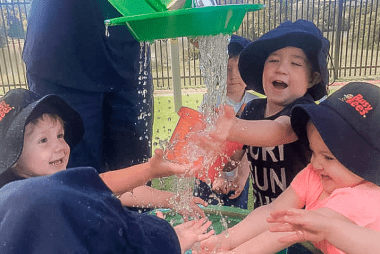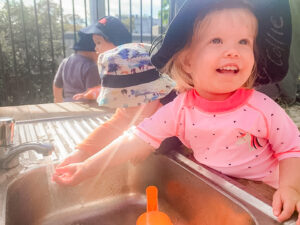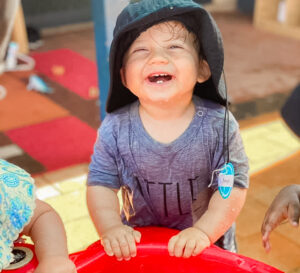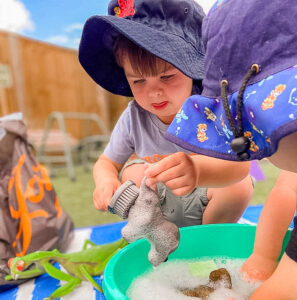
Image: Busy Bees at Heritage Parc
With Australia’s glorious weather, it’s always a good time to get outside and explore, and there’s nothing more fun than spending time splashing and frolicking in the water!
Playing with water not only keeps your child feeling cool, but you may be surprised to learn that water play has so many amazing benefits for early childhood development, contributing to various developmental milestones. Such milestones include the development of fine motor skills, cognitive growth, social interaction, and emotional regulation, making it one of the most popular activities in early childhood education. In this article you’ll discover six compelling reasons why water play is essential for growing children.

Image: Busy Bees at Everton
What is Water Play?
As the name suggests, water play involves activities that use water alongside tools that allow children to splash, scoop, pour, submerge, and explore their senses. Water sensory play is a cornerstone of early childhood exploration, where children learn by doing. Imagine a child dropping ice cubes into water table and watching them melt, or feeling the squishy texture of water beads.
Moreover, water play supports critical areas of childhood development. It encourages children to express their creativity and imagination, leading to rich exploratory learning experiences with language, social and emotional skills, offering endless opportunities for growth and development for infants, babies and toddlers.

Image: Busy Bees at Kalgoorlie
Water Play Benefits: Enhancing Physical, Social and Emotional Skills
Water play in early learning settings usually involves a water table or large tub where children can stand around and engage in interactive play. For toddlers, this setup fosters social development where they learn to share, communicate, and cooperate while splashing and experimenting with different water textures. Water play for babies introduces water sensory play, such as feeling water trickle over their hands that stimulate their sense of touch, sight, and sound.
Here are more ways water play can benefit physical and social-emotional growth:
1. Water play develops hand-eye coordination:
Water play activities help to develop and strengthen children’s gross and fine motor skills and physical fitness. Engaging in lifting, pouring, carrying, and squeezing help to develop the small muscles in a child’s hands.
2. Water play introduces scientific concepts:
As children use water play materials they are exposed to scientific concepts such as numeracy, weight and volume. For example, water play can also be used to develop children’s numeracy skills, such as counting how many buckets of water it takes to fill a tub, or observing the weight of an object by seeing how much water is displaced when added to a bucket of water.
3. Water play enhances concentration and focus:
Have you ever found your child completely immersed in an experience? When children engage in water play, they tend to lose themselves in the activity and can spend long periods exploring and playing. This teaches the child to focus, and any activity that holds a child’s attention for a long length of time will contribute to increasing their attention span and ability to concentrate. This is a particular beneficial for formal learning. As your child prepares to begin school, being able to concentrate in a classroom will become a vital skill.
4. Water play develops fine and gross motor skills and sensory exploration:
Water play activities help to develop and strengthen children’s gross and fine motor skills. Children enhance their gross motor skills, coordination and physical fitness through lifting, pouring, and carrying, while actions such as squeezing help to develop the small muscles in a child’s hands. Water play also provides children with so many opportunities to explore their senses and experience different sensory experiences. Adding materials like sand, ice, or soap to water allows children to put their hands in different textures (gritty, squishy, and slippery) as well as experience different temperatures (warm, cool, cold.)
5. Water play builds social skills:
Water play can be a solitary activity, but children find it a great way to engage in social interaction and group activity. It’s not uncommon to observe kindergarten children work together, for example, to turn their water play into a shared experience with a common goal. For example, children may embark on a mission to build a water structure in the sandpit or take turns jumping into the water to see who can make the biggest splash. In these play experiences, every child has a role to play. This fosters crucial social skills benefits by teaching children how to take turns, and communicate effectively, laying a foundation for successful social interactions in the future.
6. Emotional and sensory benefits of water play:
Water play offers surprising benefits for emotional and sensory development. Engaging in water sensory play allows children to express and manage their emotions in a healthy way. For example, the calming benefits of splashing water can be a fun way to release pent-up energy. This helps children understand and regulate their emotions better.
7. Water Play encourages empathy:
Water play encourages children to consider the feelings and needs of others. For instance, taking turns with water toys or sharing a water table can help children develop empathy and understanding. They learn to recognise and respond to the emotions of their peers.
8. Water Play helps children with self-regulation skills:
Water play helps children develop self-regulation skills, such as controlling impulses and managing frustration. For example, waiting for a turn to use a water toy or taking a break from water play can help children practice self-regulation. These skills are crucial for their overall emotional development.
9. Water Play has therapeutic benefits:
Water play can be a therapeutic activity for children, providing a calming and soothing experience. This can be especially beneficial for children with anxiety or sensory processing issues. The gentle flow and sound of water can create a relaxing environment, helping children feel more at ease.

Image: Busy Bees at Burpengary East
Enjoying Water Play at Home
Creating a water play area at home can be a fun and easy way to provide your child with an engaging and educational experience. Here are some tips and ideas for setting up a water play area at home:
-
Choose a Safe Location:
Select a location that is safe and accessible for your child. A flat, smooth surface is ideal for water play. Ensure the area is free from hazards and has good drainage to avoid any slips or falls.
-
Use a Water Table or Container:
A water table or large container is perfect for water play. You can also use a kiddie pool or a large tub. These provide a contained space for your child to explore and play with water.
-
Add Water Toys and Accessories:
Add a variety of water toys and accessories. These items can enhance the play experience and provide opportunities for learning and exploration.
Some examples of materials you can incorporate in water play are:
Cups and containers of different sizes
Spades and buckets
Toys and objects that will sink or float
Funnels, bottles or eye droppers that can be used to transfer water between containers
Natural materials such as sand, flowers, leaves and pebbles
Squeeze bottles
Paint brushes
Sieves or containers with holes
-
Incorporate Sensory Stimulation:
Incorporate sensory stimulation, such as water beads, sand, or rice, to add texture and interest to the water play area. This can help develop your child’s sensory processing skills and keep them engaged for longer periods.
-
Provide Adult Supervision:
Always provide adult supervision during water play to ensure your child’s safety. This is especially important for younger children who may not be aware of potential dangers. Supervision also allows you to guide and interact with your child, enhancing the learning experience.
Download our activity card for a fun water experience for babies and toddlers.
Whether at home or in early learning settings, providing opportunities for water play fosters creativity, learning, and social growth. With proper supervision and simple setups, parents and educators can make water play a rewarding and enriching part of a child’s development journey.